July 19, 2013
by Robin Parker -
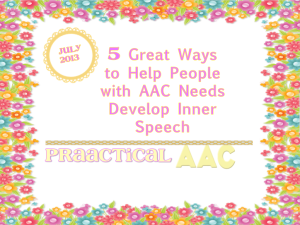
Inner speech is important. Recent research has strengthened our belief that developing inner speech is an important strategy for many people who use AAC and are working to build their literacy, sensory, and language skills. But how do we teach someone to develop that inner voice? Here are some ideas. 1. Begin by using a ‘think aloud’ strategy to make your internal thought processes obvious to the person who uses AAC. Articulating your thoughts as you work through different communication and literacy learning processes gives the learner insight into what you are thinking. Once they are used to that, it is easier to introduce the concept of private/inner speech. – 2. Use explicit instruction. “Say it to yourself.” “Say it in your head.” Using natural gestures, like tapping your temple, can be helpful as well. We’ve found that this allows us to reduce the prompting over time. Fade the verbal prompt and... [Read More...]
Filed under: PrAACtical Thinking
Tagged With: inner speech
July 18, 2013
by Carole Zangari -
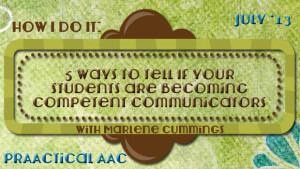
It’s always a good day when we get to share the thoughts of veteran AAC SLP, Marlene Cummings. In this post, Marlene talks about the signs to look for as clients gain skills with AAC and wraps up her series of posts on her yearlong experience in providing embedded professional learning experiences in Oakland Schools. You can see her earlier posts on cultivating the right mindset, their framework for AAC success, her AAC implementation toolbox, and the communication environment. 5 things in our “Destination Toolbox” “Are we there yet?” or “Five Ways to Tell That Your Students are Becoming Competent Communicators” Students are: Participating in the purposes of communication by novelly generating multiple word phrases demonstrating a variety of communicative functions Taking multiple communicative turns with multiple partners in multiple environments Using words from many different word classes Using words to talk about words Using language to communicate and communicating to learn... [Read More...]
Filed under: PrAACtical Thinking
Tagged With: competent communicator, goals, How I Do It, Marlene Cummings
July 17, 2013
by Carole Zangari -
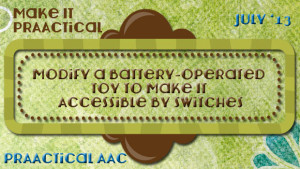
Professionals of a certain age (ahem) may remember when the only switch-accessible toys we had to work with were the ones we adapted ourselves. Now, of course, there are a wide range of battery-operated toys that are already switch-accessible and we can buy as many as the budget will allow. The problem is that most of us have pretty limited resources for purchasing these toys, and a quick search yielded adapted toys in a wide price range ($45.00-$250.00 USD). Buying regular (non-adapted) battery-operated toys and then adapting them yourself is another option. This video explains the principles. “Me?? Adapt a toy for switches?! But I’m not handy.” “That’s okay. You don’t have to be.” The easiest way is to use an inexpensive battery interrupter. You can purchase them in various sizes (e.g. AAA, AA, C, D) or make your own. You can learn more about battery interrupters and how to... [Read More...]
Filed under: PrAACtical Thinking
Tagged With: battery adapter, DIY, switch accessible, switches, toys
July 16, 2013
by Robin Parker -
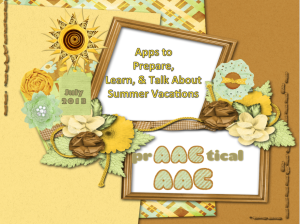
Vacations are great! But all great vacations need preparation because new experiences and change can be stressful even if the stress is good. Vacations are also opportunities for lots and lots of meaningful language experiences. Here are some apps specific to vacations but also don’t forget your schedule apps (e.g., Choiceworks, Kids Calendar, etc) or your story creations apps (e.g., Pictello, Story Creator, iCreate… Social Skills Stories, etc.) to customize for specific personal vacations. Prepare, Learn, & Talk About Summer Vacations My Little Suitcase by Moms with Apps Packing for Vacation- Prepare your suitcase for Traveling Bogga Vacation Planes by Byron Barton Miko Goes on Vacation: An interactive bedtime story book for kids about Miko’s first beach holiday, where he enjoys swimming and making new friends, by Brigitte Weninger illustrated by Stephanie Roehe. Roxie’s a MAZEING Vacation Adventure Lucy’s First Flight: A Geography Story Panda Book ... [Read More...]
Filed under: PrAACtical Thinking
Tagged With: Apps, meaningful language experiences, summer, vacation
July 15, 2013
by Carole Zangari -
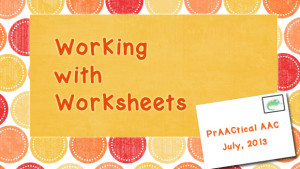
We’re not big fans of worksheets. In fact (true confession!), many years ago we actually hid a notebook full of them from a colleague who seemed to think they should play a prominent role in aphasia therapy. However, we concede that they are sometimes useful in limited quantities (‘sometimes’ being the operative word). More importantly, if teachers use them, we want our kids to be able to participate. Those who have difficulty with fine motor skills need alternate ways to manage worksheets so that they can be as independent as possible. Summer seems like a good time to learn a few new things that will come in handy once school resumes. If you’re looking for ways to make worksheets accessible on a shoestring, check out these resources. This presentation from Lynda Hartmann gives a good overview of accessible worksheets and provides information on a number of tools that you can use.... [Read More...]
Filed under: PrAACtical Thinking
Tagged With: accessibility, accessible materials, literacy, PDF, worksheets, writing
July 12, 2013
by Carole Zangari -

We wanted to be sure that none of our prAACtical friends missed this series of great posts by Kate Ahern of Ahern TEC (Technology, Education, and Consulting). Kate’s content is informed by her direct instruction with students, but also by her experience in consulting with families and educational teams, teaching workshops, and presenting at conferences. Her popular blog, Teaching Learners with Multiple Special Needs, is one of our ‘Go – To’ sites for solid content about technology, instruction, and communication for people with significant special needs. We loved the series that Kate did on the concept of teaching yes/no. It explores the complexity of yes/no and provides information on the various communicative functions that are served. The Yes/No Series Part 1 Part 2 Part 3 Part 4 Part 5 Part 6 Hope you take a few minutes to explore these posts. There is great information for AAC newbies and seasoned... [Read More...]
Filed under: PrAACtical Thinking
Tagged With: Kate Ahern, yes/no
July 11, 2013
by Robin Parker -
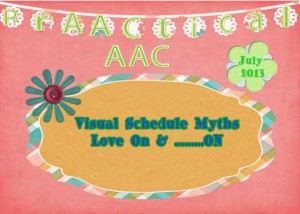
There are many myths about visual schedules for learners with special needs. Those myths multiply for older learners as well as for learners who are thought to have higher or lower skills. It is amusing to us (in a not really funny way) that these myths don’t typically extend to the SLP’s, educators, or other professionals and THEIR schedules/day planners. We have heard a lot of visual schedule myths in the last couple of weeks, which means the topic may need some re-visiting. Here are some TRUTHS about visual schedules. Please share if these myths come up in your area. Visual Schedules Increase INDEPENDENCE– Independence is supported when you can follow a visual schedule and do not need another person with you to tell you the steps to complete a day or a task. Independence is also facilitated when you can check for yourself when an event is happening rather than... [Read More...]
Filed under: PrAACtical Thinking
Tagged With: myths AAC, visual schedules
July 10, 2013
by Robin Parker -

This month’s strategy is about AAC and older children. This topic happens to dovetail with some work I am doing regarding healthcare options for many of the children in our community who have quickly become adults. It seems like so many families struggle to find physicians and dentists who have experience working with adults with autism spectrum disorder and/or developmental disabilities. It seems that as children become adults, their pediatric doctors and dentists say goodbye and families are left to fend for themselves. A workgroup of parents and professionals are trying to change this trend by finding interested physicians and providing them with formal training options, introducing them to their personal adult children, and working with medical school and residency programs. As I was researching some healthcare training options, I came upon the American Academy of Developmental Medicine and Dentistry (Thanks Deborah Chin). As I was reading through the website... [Read More...]
Filed under: PrAACtical Thinking
Tagged With: Allied Health Professionals, communication, communication boards, Health, Older Children and Adults, Physicians, Training
July 9, 2013
by Robin Parker -
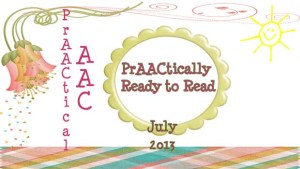
It’s summer and hot where we live (really hot!), humid (really humid)!. This weather makes it a good time for quiet, peaceful activities. Reading is high on our list. No pressure, enjoyable reading. We want ALL learners to enjoy reading. From simple single message voice output devices/apps to high-tech core language based SGDs and everywhere in between, there are lots of prAACtical opportunities for communication building, literacy learning, and just plain fun through reading. Interactive reading, reading aloud to someone, or reading to yourself can all be done in air-conditioned homes or libraries or by the pool or beach where you can cool down with a quick swim. Here are some great resources for adapted books, communication boards to go with books, and visual supports to help with reading. Find a good book, stay cool, and enjoy: New York City Department of Education: Adapted Books Baltimore City Schools- Book Specific Communication... [Read More...]
Filed under: PrAACtical Thinking
Tagged With: adapted books, literacy, reading
July 8, 2013
by Robin Parker -
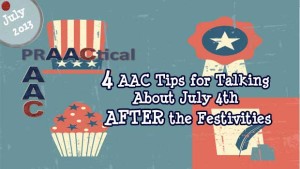
Make a Plan – Schedule a time to ‘talk about the past event (July 4th). The plan can include a ‘talk time’ or a time to collect remnants, photos, or related items from the event. Use a calendar or schedule to plan AAC style. Put Together A ‘Talking’ Photo Album– Gather all the photos from the activity and put together a talking photo album. You can use any talking photo album where you record a voice or use a story creation app that has recorded (digitized) or computer generated speech (synthesized). The process of making the photo album can be the ‘past event’ conversation and/or a review/reading can be the ‘conversation’. For some learners, turning the pages is the beginning of talking about past events while for other learners the pictures will be the opportunity for the conversation. It is helpful to use text and speech as you create the... [Read More...]
Filed under: PrAACtical Thinking
Tagged With: calendars, Conversation, July 4th, past events, schedules









